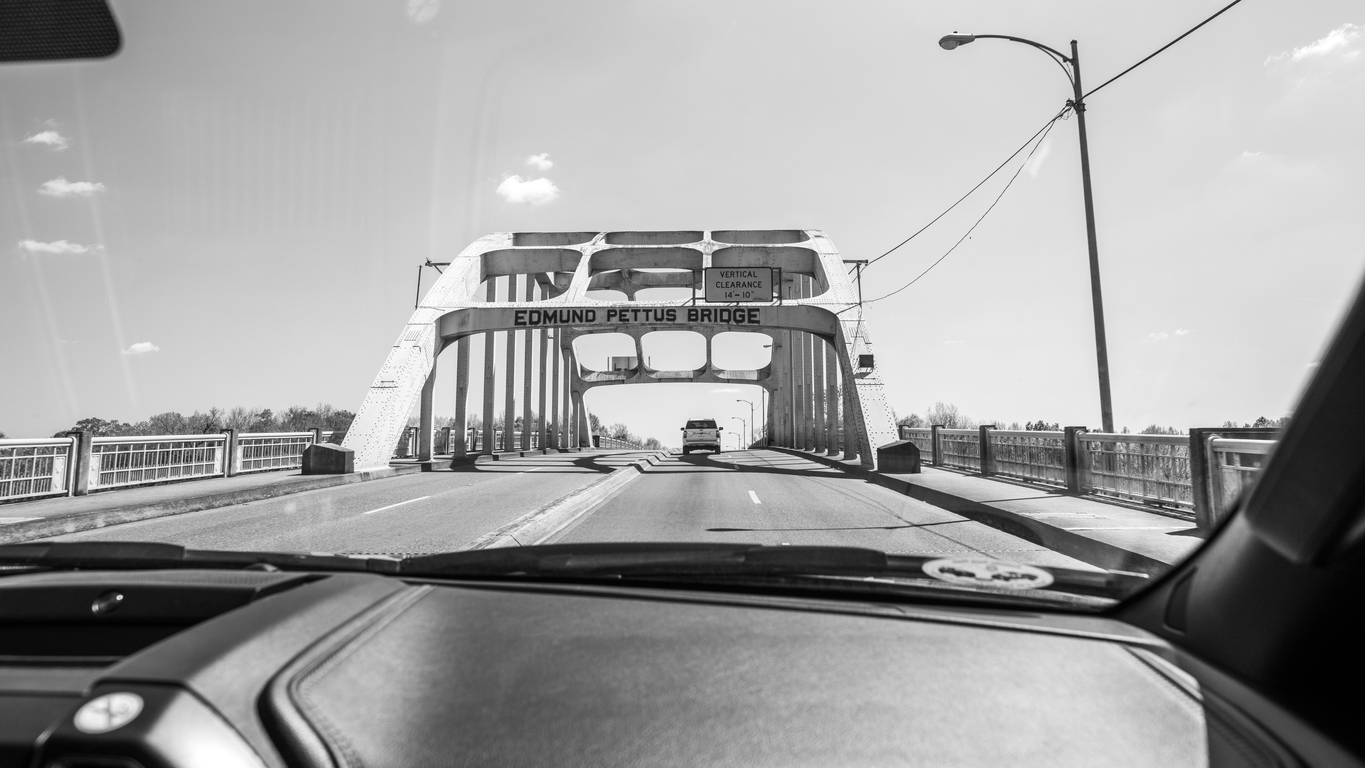Time Period: Civil Rights Era, 1955-1970s
Location: United States
Main Actors: The Southern Christian Leadership Conference (SCLC); Labor unions
Tactics
– Mass action
– Boycotts
– Protests/Marches
– Protective Presence/Witnessing
Following the success of the Montgomery bus boycotts, civil rights leader Bayard Rustin identified the need for a central organization to coordinate and support nonviolent direct action across the South. Martin Luther King, Jr., consulting with Rustin, invited other Black leaders and ministers to establish a coalition that would mobilize the community and strengthen the influence of churches against segregation. Together, they established the Southern Christian Leadership Conference in 1957.
Unlike other umbrella groups that recruited individual members, the SCLC leveraged faith communities and other local organizations to mobilize individuals into a collective movement equipped to fight segregation, advocate for voting rights, and promote nonviolent action as a strategy. And, given its coalition-based approach, the SCLC developed a strong alliance with labor unions. Several labor unions—including the Teamsters, the United Packinghouse Workers of America (UPWA), and the United Auto Workers (UAW)— supported SCLC campaigns by organizing union members to participate in direct-action protests, marches, and other acts of civil disobedience. Together, the SCLC and labor unions coordinated mutual solidarity under the banner of “jobs and freedom.”
In 1962, the SCLC launched Operation Breadbasket to create economic opportunities in Black communities. Operation Breadbasket was a selective patronage program that leveraged the persuasive power and organizing strength of Black churches. Groups of ministers surveyed the hiring practices of local businesses, then requested that companies with few (or no) Black employees “negotiate a more equitable employment practice” and hire qualified candidates within a set time frame. At the same time, these ministers urged their congregations to (re)consider the morality of shopping at stores or buying from businesses that took money from the Black community but underemployed African Americans (leading to several boycotts and “Don’t Buy” picketing initiatives). When the SCLC implemented Operation Breadbasket in Chicago, members of the Teamsters and the UPWA unions helped with on-the-ground movement building.
Ralph Helstein, who led UPWA for 20 years, closely advised Martin Luther King, Jr. and the SCLC. Helstein was a “pioneer” of the Civil Rights movement, and the meatpackers union focused on expanding equal employment rights for minorities through its Anti-Discrimination Department. Under Helstein’s leadership, the UPWA supported the Montgomery bus boycott by providing training to organizers and by donating money to support the protest. Members of the UPWA offered additional support to the SCLC by participating in civil rights campaigns throughout the country during the 1950s and 1960s. The union also launched a Fund for Democracy in the South, which raised over $11,000 in local contributions for the SCLC. Additionally, the UPWA supported students who were involved in the Civil Rights movement through scholarships and Helstein contributed his experience as a labor organizer to help the SCLC train student volunteers.
In addition to UPWA, the United Auto Workers and the American Federation of Labor and Congress of Industrial Organizations (AFL-CIO) also shared the SCLC’s vision for “jobs and freedom.” These labor unions joined the 1963 March on Washington in support of robust civil rights legislation. Union members were among the 200,000 who marched to protest high levels of Black unemployment, work that offered most African Americans only minimal wages and poor job mobility, systematic disenfranchisement of many African Americans, and the persistence of racial segregation in the South. Labor groups were instrumental allies of the SCLC and the Civil Rights movement because unions underscored the social, political, and economic impact of racial equality.
Throughout the 1950s and 1960s, labor unions offered institutional support for the Civil Rights Movement and were strong allies of Civil Rights leaders like Martin Luther King Jr. One key takeaway is that diverse groups strengthen movements. Even though labor unions were founded to protect worker’s rights, the unions which supported the Civil Rights movement recognized the value of advocating for (and with) other marginalized groups.
Another essential lesson this case offers is the power of collaboration. The SCLC deployed its network to protest and take other meaningful action, and labor unions offered a systematic, organized framework of support that ensured the SCLC could maintain its pro-democracy efforts. This cross-issue, collective action produced a more robust movement. By engaging in civil rights action, unions fulfilled a critical role in building American multi-racial democracy.
Where to Learn More
– The National SCLC | SCLC History
– Southern Christian Leadership Conference (SCLC)
You can access all the caselets from the Pillars of Support Project here.

